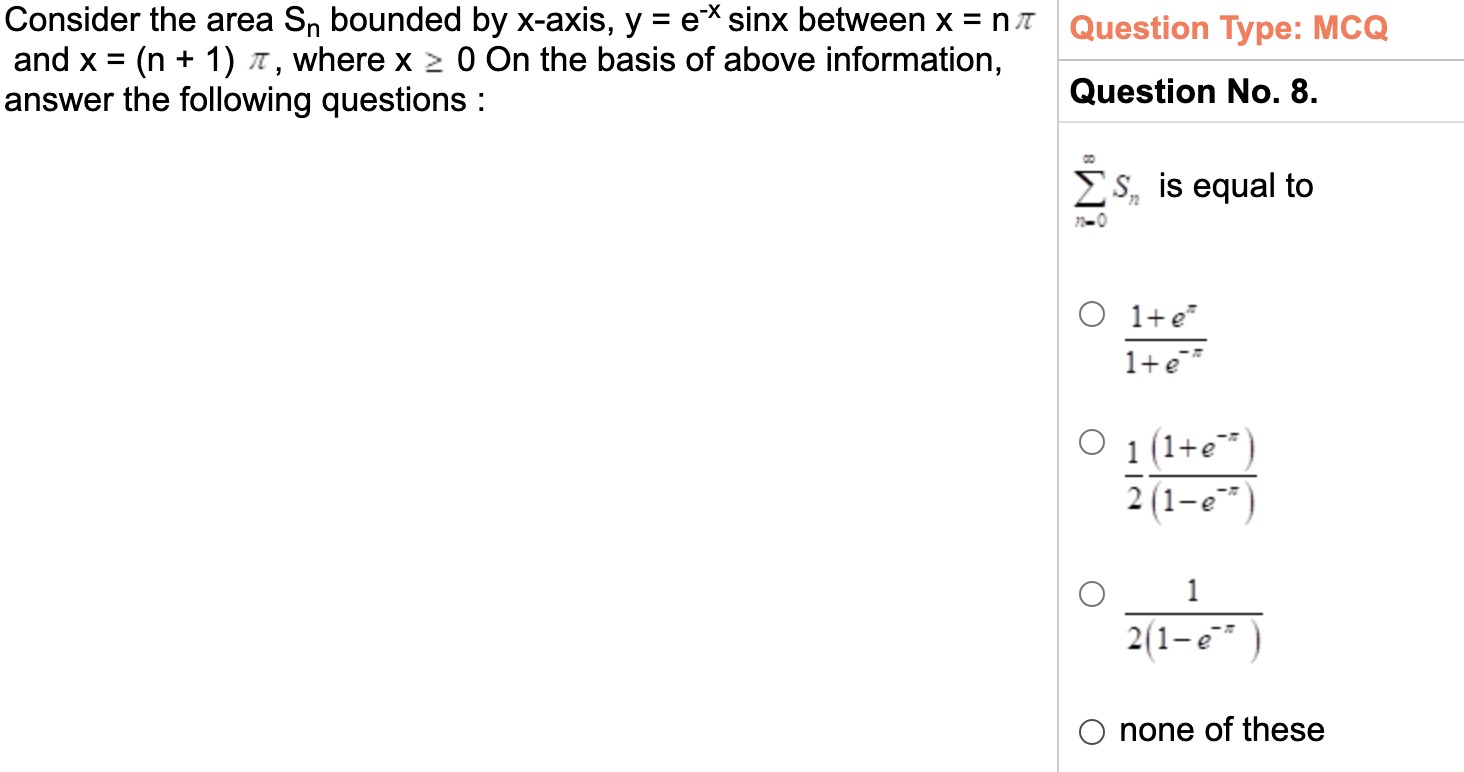Question
Question: $\sum_{n=0}^{\infty} S_n$ is equal to...
∑n=0∞Sn is equal to

1+e−π1+eπ
21(1−e−π)(1+e−π)
2(1−e−π)1
none of these
21(1−e−π)(1+e−π)
Solution
The area Sn is given by the integral of the absolute value of the function y=e−xsinx from x=nπ to x=(n+1)π.
Sn=∫nπ(n+1)π∣e−xsinx∣dx.
Since e−x>0 for all x, this is Sn=∫nπ(n+1)πe−x∣sinx∣dx.
In the interval [nπ,(n+1)π], the sign of sinx is constant, given by (−1)n.
So, ∣sinx∣=∣(−1)nsin(x−nπ)∣=∣sin(x−nπ)∣. For x∈[nπ,(n+1)π], let u=x−nπ, then u∈[0,π]. In this interval, sinu≥0, so ∣sinu∣=sinu.
Thus, ∣sinx∣=sin(x−nπ).
Let's use the substitution u=x−nπ in the integral for Sn. When x=nπ, u=0. When x=(n+1)π, u=π. dx=du.
x=u+nπ, so e−x=e−(u+nπ)=e−ue−nπ.
∣sinx∣=sin(x−nπ)=sinu.
Sn=∫0πe−ue−nπsinudu=e−nπ∫0πe−usinudu.
Let A=∫0πe−usinudu. We can evaluate this integral using integration by parts.
Let I=∫e−usinudu.
Using integration by parts ∫fg′=fg−∫f′g:
Let f=sinu, g′=e−u. Then f′=cosu, g=−e−u.
I=−e−usinu−∫cosu(−e−u)du=−e−usinu+∫e−ucosudu.
Now evaluate ∫e−ucosudu. Let f=cosu, g′=e−u. Then f′=−sinu, g=−e−u.
∫e−ucosudu=−e−ucosu−∫(−sinu)(−e−u)du=−e−ucosu−∫e−usinudu=−e−ucosu−I.
Substituting this back into the expression for I:
I=−e−usinu+(−e−ucosu−I)
2I=−e−u(sinu+cosu)
I=−21e−u(sinu+cosu)+C.
Now evaluate the definite integral A:
A=[−21e−u(sinu+cosu)]0π
A=(−21e−π(sinπ+cosπ))−(−21e−0(sin0+cos0))
A=(−21e−π(0−1))−(−21⋅1⋅(0+1))
A=21e−π+21=21(1+e−π).
So, Sn=e−nπA=e−nπ21(1+e−π).
We need to find the sum ∑n=0∞Sn.
∑n=0∞Sn=∑n=0∞e−nπ21(1+e−π)
∑n=0∞Sn=21(1+e−π)∑n=0∞(e−π)n.
This is an infinite geometric series with first term a=(e−π)0=1 and common ratio r=e−π.
Since π>0, e−π<1, so the series converges.
The sum of the geometric series is 1−ra=1−e−π1.
Therefore, ∑n=0∞Sn=21(1+e−π)1−e−π1=211−e−π1+e−π.
